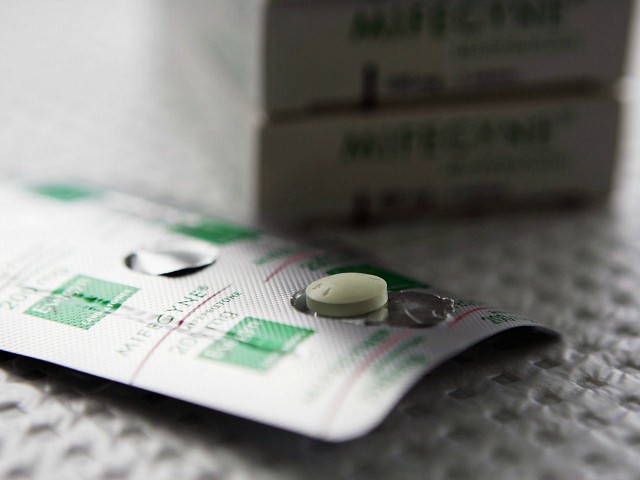Several pro-life organizations, 67 members of Congress and 23 state attorneys general filed briefs in a lawsuit against the U.S. Food and Drug Administration (FDA), asking the court to block the agency’s approval of mifepristone, the first pill used in a two-step medication abortion regimen.
The Alliance Defending Freedom (ADF) filed the lawsuit in the U.S. District Court for the North District of Texas in November of 2022 against the FDA on behalf of four national medical associations and several doctors, alleging that the agency “chose politics over science and approved chemical abortion drugs for use in the United States.” The lawsuit points to six discrete agency actions since the legalization of mifepristone and misoprostol in 2000, and asks the court to hold the actions unlawful, which would ultimately take mifepristone off the market.
An amicus brief filed by 22 states (Missouri filed separately for a total of 23) in support of the medical associations and doctors states that “rather than respect the Constitution, the Supreme Court, and the democratic process, the Biden Administration has attacked and worked to undermine the considered judgments of the elected representatives of States like amici.”
“The Administration’s actions on abortion drugs typify that effort…. The serious nature of the FDA’s unlawful actions, and the agency’s decision to invite lawbreaking by private parties and government actors across the country, favors broad relief,” the brief continues. “The FDA and the Administration as a whole have no intention to respect the Constitution, the Supreme Court, or the democratic process when it comes to abortion. This Court’s decisive action is warranted.”
The ADF’s complaint states that the “only way” the FDA could have approved chemical abortion drugs “was to use its accelerated drug approval authority, necessitating that FDA to call pregnancy an ‘illness’ and argue that these dangerous drugs provide a ‘meaningful therapeutic benefit’ over existing treatments.”

File/ The abortion drug Mifepristone, also known as RU486, is pictured in an abortion clinic February 17, 2006 in Auckland, New Zealand. (Phil Walter/Getty Images)
“But pregnancy is not an illness, nor do chemical abortion drugs provide a therapeutic benefit over surgical abortion. In asserting these transparently false conclusions, the FDA exceeded its regulatory authority to approve the drugs,” the complaint states.
The lawsuit alleges that the FDA never studied the safety of mifepristone under the labeled conditions of use, ignored the potential impacts of the hormone-blocking regimen on the developing bodies of adolescent girls, disregarded evidence that chemical abortion drugs cause more complications than surgical abortion, and eliminated necessary safeguards for pregnant girls and women who take the regimen.
The lawsuit further details how, in 2016, the FDA extended the permissible gestational age of the baby for which a girl or woman may take the abortion drugs —from seven weeks gestation to ten weeks gestation. Then in 2019, the FDA allegedly approved a generic version of the drug “without requiring any new clinical investigations or studies that evaluated the drug’s safety and effectiveness under the requirements” under several laws, according to the complaint.
In 2021, the FDA then allowed abortionists to send mifepristone through the mail, which the ADF says was “in direct violation of federal law.” The FDA recently made permanent its rule to allow women and girls to receive a prescription for mifepristone via telemedicine. The complaint alleges:
All of the FDA’s actions on chemical abortion drugs—the 2000 approval, the 2016 major changes, the 2019 generic drug approval, and the two 2021 actions to eliminate the in-person dispensing requirement—failed to acknowledge and address the federal laws that prohibit the distribution of chemical abortion drugs by postal mail, express company, or common carrier. Instead, the FDA’s actions permitted and sometimes even encouraged these illegal activities.
The Charlotte Lozier Institute filed a brief as well, warning the court that ” the FDA’s new regulations now allow women to self-manage their chemical abortions without ever seeing a doctor in person.”
The brief reads:
Yet the consequences of telemedicine chemical abortion are almost too numerous to count—lack of necessary ultrasounds to confirm gestational age and rule out ectopic pregnancy, inability to confirm that a woman is not being coerced to obtain an abortion, abandonment of women to deal with the medical and psychological repercussions of abortion by herself with no follow-up, and grave harm to physicians who are expected to clean up the mess (in the ER and elsewhere) of self-managed abortion.
The brief filed by members of Congress also accuses the FDA of “exceeding the scope of its delegated power from Congress” and “subvert[ing] Congress’ public policy interests in patient safety.”
See the full list of briefs filed here.
“Amici highlight how chemical abortion drugs pose serious threats to the health and safety of women and girls, and a preliminary injunction is in the interest of public policy to protect patient safety,” the lawmakers state in their brief.
On the other side of the case, 22 Democrat state attorneys general filed a brief last week opposing an injunction and arguing that blocking mifepristone “would be nothing short of catastrophic, causing shock waves nationwide.” Those attorneys general further argue that they have the authority to “promote access to abortion” in their states because the Supreme Court’s decision allowed “elected representatives” to make decisions about abortion.

File/Containers of the medication used to end an early pregnancy sit on a table inside a Planned Parenthood clinic Friday, Oct. 29, 2021, in Fairview Heights, Ill. Women with unwanted pregnancies are increasingly considering getting abortion pills by mail. (AP Photo/Jeff Roberson)
“Annulling the FDA’s approval of mifepristone would, in effect, eviscerate [states’] sovereign decisions to protect the right to choose to terminate a pregnancy,” the brief states.
The FDA filed in opposition to the motion for preliminary injunction on January 13, 2023, calling plaintiffs’ request “extraordinary and unprecedented.” The FDA claims that the issuance of a preliminary injunction would “cause significant harm” and deprive patients of “a safe and effective drug that has been on the market for more than two decades.” The agency argues:
Entry of a preliminary injunction here would hardly serve the typical purpose of such relief—maintaining the status quo during the pendency of litigation. Rather, it would upend the status quo and the reliance interests of patients and doctors who depend on mifepristone, as well as businesses involved with mifepristone distribution. The balance of the equities and the public interest thus also strongly favor denial of Plaintiffs’ motion.
The Texas judge’s decision on whether to temporarily block the FDA’s approval of the abortion pill is expected to be released in late February.
The case is Alliance for Hippocratic Medicine v. U.S. Food and Drug Administration, No. 2:22-cv-223 in the U.S. District Court for the Northern District of Texas.

COMMENTS
Please let us know if you're having issues with commenting.